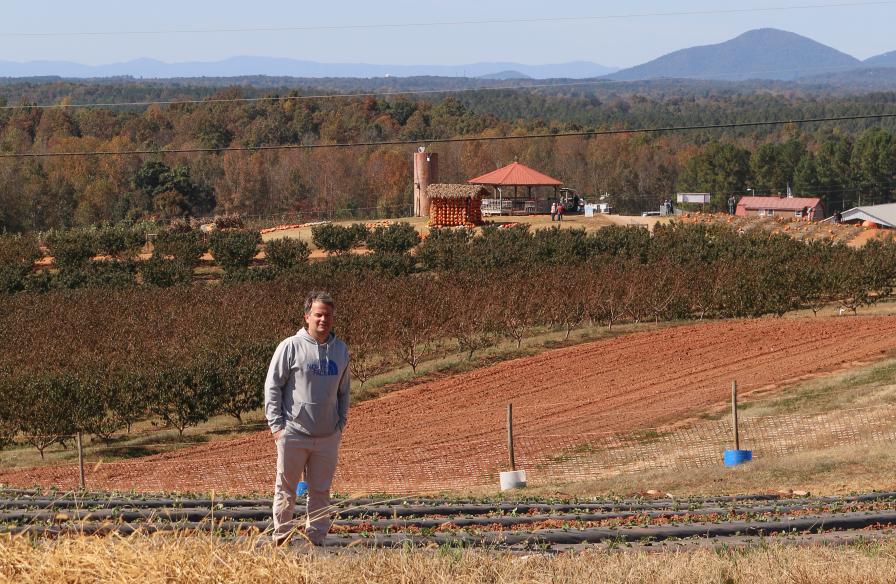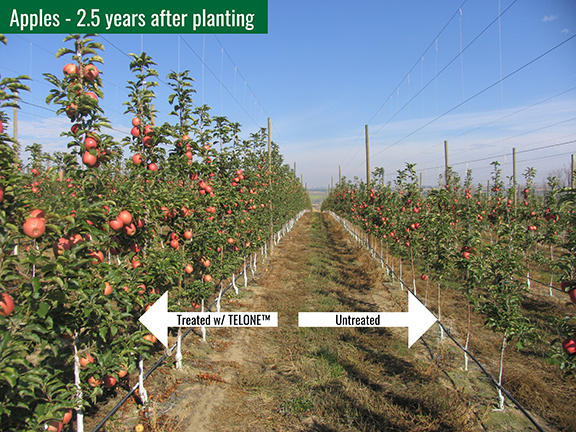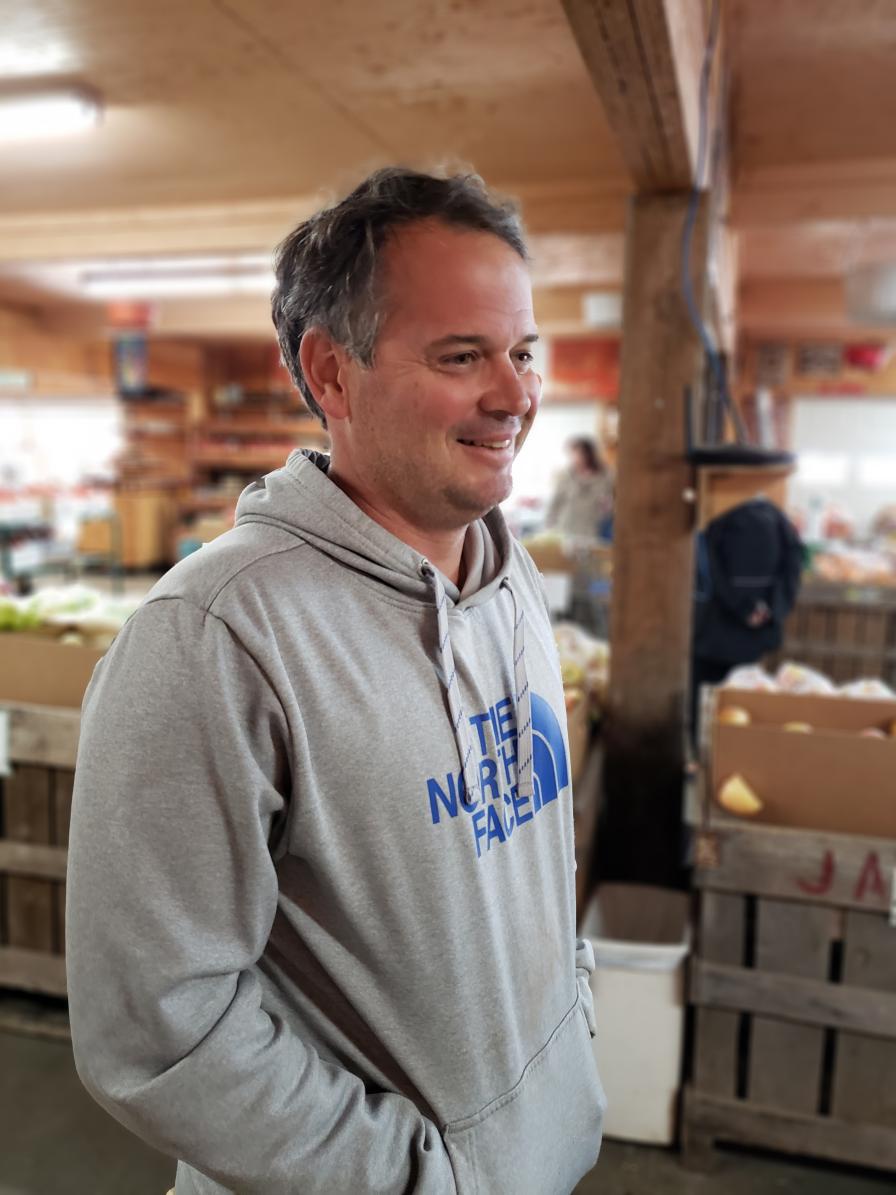How Jaemor Farms Has Found Way More Ways To Profit and Prosper

Sixth-generation Co-Owner Drew Echols presides over his 510-acre operation, Jaemor Farms, in Lula, GA.
Photo by Carol Miller
With history and hustle to its credit, Jaemor Farms has fast-tracked itself into a model of retail marketing.
Established in 1912, the produce farm in the Blue Ridge foothills of northern Georgia wasted no time initiating what today would be considered direct-to-consumer sales. The first of what is now six generations of the Echols family peddled peaches, blackberries, and summer apples from carts on the side of an old dirt road that would one day become state Route 23.
“Believe it or not, they were always retail minded,” current Jaemor Farms co-owner Drew Echols, 44, says of his forefathers. “My granddad’s grandfather was selling right off the road there from the get-go. No tent, no shed.”
More than a century later, with the addition of cutting-edge forms of agritourism, the grower-customer relationship is tighter than ever at the 510-acre operation in Lula, GA. On average, more than a million customers visit annually. A 6-acre corn maze, built in 2006, alone attracted 40,000 visitors last fall and nearly 30,000 the previous year.
“I feel like we’ve done a pretty decent job of starting out retail minded and then getting into the agritourism side of things, with field trips and corn mazes and all that kind of stuff,” Echols says. “When that happened around 2006, that’s when everything just started going gang busters.”

American Vegetable Grower’s GROW STRONGER initiative brings you positive stories from progressive growers filled with innovative solutions to help you grow a stronger future.
Peach production doubled from 40 acres to 80 acres after 2006 and now stands at 150 acres. Strawberry production opened at 3 acres in 2011 and now stands at 25 acres. Other prominent crops include 200 acres of pumpkins and 40 acres of summer vegetables, including beans, tomatoes, sweet corn, and melons.
While Echols admits he would much rather be riding a tractor or working with a crew on an irrigation job, he respects the power of direct-to-consumer marketing.
“You sort of have to do it all. I don’t think I could farm like this in north Georgia if I didn’t have that retail component and the agritourism component,” he says.
Better yet, with retail now accounting for 70% of his sales, Echols deals with fewer wholesale accounts.
“I’ve got a few extra peaches over here for the next couple of weeks, and we’ll be sending some of those out of here (wholesale), but that is a hard way to make a living,” Echols says. “I was the president of the Georgia Fruit and Vegetable Grower Association, so I’m fully aware of these shipper/packers and how all that works. I’m glad somebody’s willing to do that, but it is definitely a hard way to make a living when you’re a price taker instead of a price setter. You don’t always get what you want.”
Direct Sales Initiatives
Jaemor Farms — then known as Echols Orchards — has come a long way since its roadside cart in 1912. In 1981 the family built its own market for on-farm shopping experiences.
“It does really well,” Echols says of the Jaemor Farm Market. “I mean, we have a million visitors a year.”
A second prominent form of direct sales at the operation are its pick-your-own crops: strawberries (May), peaches (July), and pumpkins (September). “It has gotten to be a huge thing,” Echols says, to the extent that he can charge a $5 admission fee per person. Customers “go nuts” over the farm’s peaches, he says. “They love getting out and picking peaches.”
The farm’s strawberry U-pick began two years ago. “We’ve done well. We’ve made money both years,” Echols says. “It’s kind of like starting a new business right here in the parking lot. You can’t just click your heels and be slammed.”
Although Jaemor Farms no longer frequents farmers markets or curb markets, it has enjoyed success with its modern-day version of roadside stands away from the farm. Since 2016 the operation has provided — per request — popup markets from a small box truck at select locations throughout northeast Georgia.
“It’s mostly at a couple of really big hospitals, but there’s a couple that are at different businesses, too,” Echols says. “We do them on a bi-weekly basis, so those people are kind of hungry for you. And it’s unbelievable how much sales we do at these things. I think it’s a brilliant business model. You don’t have the money tied up in brick and mortar.”
Jaemor Farms only dabbles in online sales, according to Echols, and is not tied to any community-supported agriculture (CSA) systems, which he believes are better suited for newer farms and operations new to direct marketing.
Agritourism Channels
Jaemor Farms currently recognizes three of five categories of agritourism and is considering adding some form of the other two.
Agri-tainment: No practice speaks more to Jaemor Farms’ direct-to-consumer success and overall growth than its corn maze. Prior to its debut in 2006, Echols was growing 5 acres of pumpkins. “We’re, like, ‘Oh, man, I can’t believe we sold 5 acres of pumpkins in one tractor and trailer load,” he says.
Today the farm sells a tractor and trailer load of pumpkins “before lunch on Saturday,” Echols says.
On the downside, agritainment, such as mazes and hayrides, is a “whole different animal” because of insurance and labor issues, according to Echols. And then there is the weather.
“On the third weekend in October, if it rains on Saturday, for us, that’s a $125,000 swing because you don’t get it back. You don’t get to say, ‘Well, we’re going to open Monday,’ and all those people will come,” Echols says. “It’s just like farming. We have to hustle when it’s corn maze time in September and October.”
But agritainment pays the bills and drives production, Echols acknowledges, to the point that he regrets pulling up his apple trees several years ago.
“I’ve got some apple trees planted again,” he says. “Like an idiot, I got out of the apple business. These customers, with apples and peaches and strawberries, now they’re paying admissions into the field plus what they pick. They pay five bucks to get into the field. I wish I had 10 acres of apples here that were about 7 or 8 years old, but I literally have a bunch of a 2-year-old apple trees.”
Lodging: Although Jaemor Farms currently does not offer lodging of any type, Echols is considering the addition of “tiny homes” in the next two to three years. They would be constructed on a secondary farm, away from the agritourism-generated crowds of the primary retail farm.
“I think that there’s some opportunity there,” Echols says. “A lot of farmers kind of shy away from that sort of thing, but I’ll tell you — it’s not harder than a food safety program; it’s not harder than a recall on some produce; and it’s not harder than wanting to sell your squash for $18 a box, and your broker calling you and telling you it’s $10 a box. I don’t know if every farm in America can have lodging or agritourism of any kind, but I think definitely more can than do now. I think the public wants it.”
Hospitality: Echols opened his first on-farm restaurant in late June, just a week before being interviewed for this story. “They’re one week into it and killing it right now,” Echols says of his staff. “Just so many people in the driveway. I mean, basically a captive audience. It was a no-brainer to be honest.”
The restaurant — a deli with the “most awesome sandwiches you’ve ever seen,” Echols says — replaces a preexisting deli that was part of the operation’s now-closed facility in Commerce, GA, about 25 miles away.
“With commercial real estate prices being what they are, we owned it, so we sold it and absorbed those employees up here,” Echols says. “It had an awesome kitchen but was basically just a big concession stand for U-pick strawberries and corn maze season and sat there idle the rest of the time.”
Outdoor recreation: Jaemor Farms does not host recreational activities, such as hiking, bird watching or hunting, but Echols does believe such offerings are “big business.” Frisbee golf is a “big deal,” he says. “People like that stuff, and it doesn’t require a whole lot of land.”
Echols is considering constructing a skeet shooting course on the same property as the tiny homes he plans to build.
“There’s some liability that comes with it … but people pay a lot of money for that,” he says. “We’re already doing some dove hunts on that farm. I’ve given away some dove hunts to some ag foundations, and they were really successful. They auction them off. They sold one for $3,000 last year and then another one for $2,400.”
Education: What had been an “awesome” field trip program at Jaemor Farms, Echols says, was interrupted by the pandemic in 2020. Up to that point the farm would attract 3,000 kids each spring and 7,000 to 8,000 more kids in the fall.
“COVID hit, and that went away,” Echols says.
The field trips did not return in 2021. And while COVID had waned by the summer of 2022, another obstacle then arrived — labor issues.
“Labor was beginning to be a problem — labor for the retail market and even the part-time labor for the agritourism,” Echols says. “Labor is always the issue out on the farm, but it’s always the issue with agritourism, too. You’ve got to have good people to communicate well with the public.”
Jaemor Farms is now in the process of revamping its fall field trip program.
“We’re going to shoot for 5,000 or 6,000 kids this fall,” Echols says. “We may not grow it as big as what it was, but we’re going to try to try to get back into that. It’s definitely worthwhile.”
Consumer Connections
What makes agritourism and direct-to-consumer sales so meaningful? Echols was reminded of as much early this summer at a Savannah, GA, restaurant, five hours from home. He and his wife and friends engaged with a waiter in his early 20s who had grown up 30 miles from Jaemor Farms.
“I was not about to say, ‘Hey, I’m one of the owners at Jaemor Farms, but my friends did,” Echols says. “They said, ‘Hey, have you heard of Jaemor Farms?’ And the guy said, ‘Oh, yeah. I remember going there in fourth grade. It was the most awesome field trip I’ve ever been on in my life.’
“That’s what the waiter at this restaurant said, five yours away from my house. For him to even remember that makes you feel good.”
In the grand scheme of things, Echols believes growers can only benefit from allowing the public on their farms.
“We tend to complain a lot about consumers not understanding and consumers buying foreign produce or whatever the issue might be,” he says. “I believe it’s a win for the industry as a whole when we bring people out to do things like that. I feel like everybody’s better because of it.”
AT A GLANCE: Jaemor Farms
Founded: 1912
Co-Owners: Jarl Echols, Judah Echols, Drew Echols
Location: Lula, GA
Size: 510 acres (40 acres agritourism)
Crops: Peaches, strawberries, pumpkins, beans, tomatoes, sweet corn, watermelon, cantaloupe, cucumbers
Customers: 70% retail, 30% wholesale
Name origin: Acronym for third-generation Owners J.immy A.llen E.chols and Valvoreth Mor.rison Echols.











